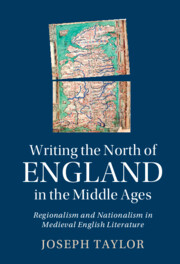 Writing the North of England in the Middle Ages
Writing the North of England in the Middle Ages Published online by Cambridge University Press: 08 December 2022
Chapter 2 explores the reshaping of English history by Latin historiographers writing in the wake of the Norman Conquest. These historians sought to incorporate the Conquest’s political rupture into seamless histories that intimated a longstanding English nation. At the forefront of this movement was William of Malmesbury. In his writing, William, however, must confront the regionalism or “northern-ness” of his chief source and inspiration, Bede, the venerable “Father of English History.” This chapter analyses how William labors to deaden Bede’s northern-ness and, further, how William engages the ruinous North of England, still smouldering from King William I’s “Harrying of the North” in 1069–70. In this destruction of the North, born of its rebelliousness, William of Malmesbury finds a startling microcosm for England. William recalls the North’s glorious Roman past, evident in the wrecked buildings of Roman vintage, that darkly forecast for the Wiltshire monk the potential failures of the larger English nation, such that it will become a ruin itself much like the city of Rome in Hildebert of Lavardin’s poem “par tibi Roma nihil,” which William quotes extensively in his work.
To save this book to your Kindle, first ensure [email protected] is added to your Approved Personal Document E-mail List under your Personal Document Settings on the Manage Your Content and Devices page of your Amazon account. Then enter the ‘name’ part of your Kindle email address below. Find out more about saving to your Kindle.
Note you can select to save to either the @free.kindle.com or @kindle.com variations. ‘@free.kindle.com’ emails are free but can only be saved to your device when it is connected to wi-fi. ‘@kindle.com’ emails can be delivered even when you are not connected to wi-fi, but note that service fees apply.
Find out more about the Kindle Personal Document Service.
To save content items to your account, please confirm that you agree to abide by our usage policies. If this is the first time you use this feature, you will be asked to authorise Cambridge Core to connect with your account. Find out more about saving content to Dropbox.
To save content items to your account, please confirm that you agree to abide by our usage policies. If this is the first time you use this feature, you will be asked to authorise Cambridge Core to connect with your account. Find out more about saving content to Google Drive.